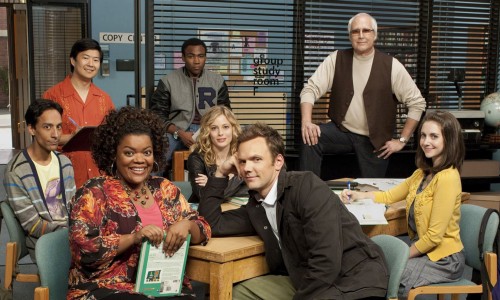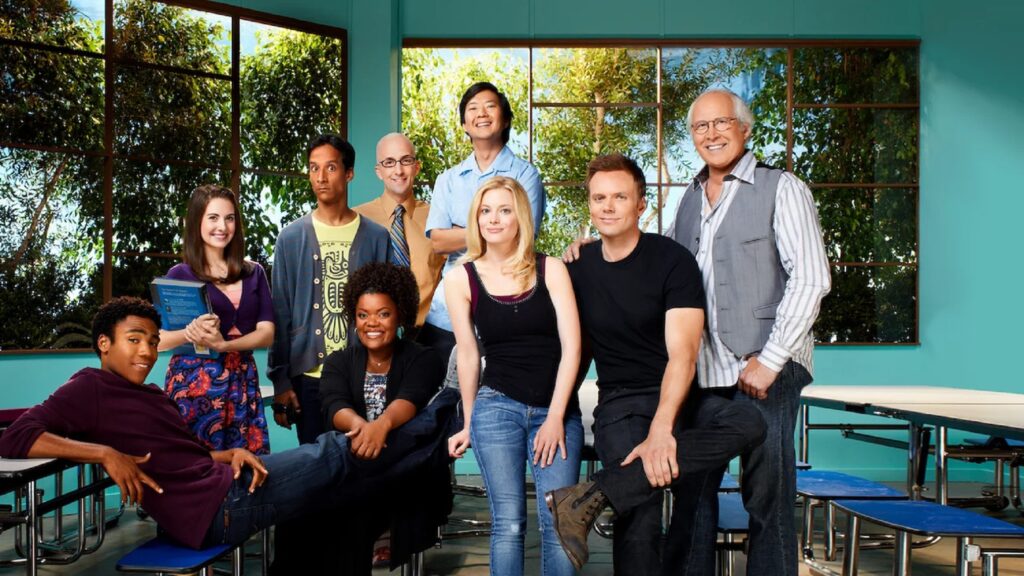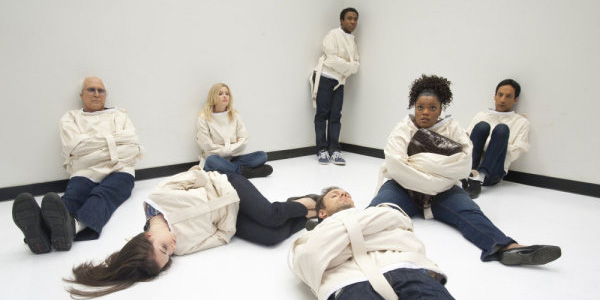By Penny Theodorakopoulou,
I enjoy watching movies a lot in my free time. They do not last long (at least most of them), they have a certain plot and if you wish you can rewatch them, it will not consume your leisure time to do so. That fact changes when it comes to TV series. In comparison to movies, I am quite picky with what series I will watch: no drama, no mystery, no sci-fi, and, certainly, no sitcoms. I can imagine myself watching series like Star Trek, Sherlock, even Korean drama. But I cannot conceive myself watching series like Friends, Modern Family, How I met your mother, etc.
The aforementioned opinion was surprisingly altered when I came across Community. Even though it is labeled as a sitcom, it certainly is not considered as one. To be more precise, Community is a series that was rather satirical of sitcoms, so maybe that is why it is my favorite TV series. Running the first five seasons on NBC from September 17, 2009, to April 17, 2014, and the last season on Yahoo! Screen from March 17 to June 2, 2015, Community is considered, at least the way I see it, a different kind of sitcom — and I shall explain further on why.
The plot
The events of the series take place in a community college in Colorado, Greendale Community College. One of our protagonists, Jeff Winger (Joel McHale), used to be a firm lawyer but was suspended because he lied about having a bachelor’s degree from Columbia University. For him to go back to the firm law he used to work at, he must have a legitimate degree — and Greendale Community College can offer him one. He enrolls at the community college and comes across a woman (Britta Perry, played by Gillian Jacobs) whom he finds quite attractive. Wanting to spend more time with her and eventually get with her, Jeff creates a made-up study group for them to study Spanish. However, Britta brings Abed Nadir (Danny Pudi) with her, who later introduces the study group to four other people: Shirley Bennett (Yvette Nicole Brown), Annie Edison (Alison Brie), Troy Barnes (Donald Glover), and Pierce Hawthorne (Chevy Chase). Due to the diversity of the group in a lot of aspects (religion, race, age, life viewpoints, etc.), the seven of them face a lot of difficulties and differences, they often argue even for the tiniest and most unimportant things, such as being locked up in the study room because Annie thinks that someone stole her purple ball pen (Season 2, Episode 8). But because of that diversity and those differences, the study group end up being good friends, even considering one another families. Every season has a different theme and plot to cover, but all in all, what we see is what happens in the lives of our seven protagonists, as well as some other notable characters, such as the dean of the community college, Craig Pelton (Jim Rash) and Ben Chang (Ken Jeong), in Greendale.

The characters
What I enjoy a lot about Community is the casting. As far as I am concerned, each actor fits the role exactly, and I cannot think of any other actor to play the roles of the seven protagonists. But let us take a deeper and more thorough look at each character:
- Jeff Winger used to work at a law firm, as we mentioned above and is now forced to get a legitimate degree from Greendale Community College. In the series, Jeff is portrayed as a quite sarcastic, narcissistic, and overconfident man who manipulates people’s minds with his “fancy, lawyer words” to get what he wants. He has created a wall around himself, hence why it is hard to approach and like him at first. However, as the story of the series continues, Jeff begins to learn to lower that wall and let his study group in. Even though he claims to not care for a problem a member of the study group may have, he eventually ends up helping them, even sacrificing himself so he can be as helpful as possible.
- Britta Perry, the second person who was responsible for the creation of the study group, is an attractive woman who has traveled around the world after dropping out of high school. She claims to be an activist and a protestor but has never really helped anyone. However, her desire to help other people, especially her friends, is more noticeable after season 3, when she decides to do so by majoring in psychology, a decision that the study group mocks since she particularly likes damaged or toxic men.
- Abed Nadir is the show’s meta character. Due to his struggle to interact with others, Abed uses TV series and movies to understand a situation and how each of his friends feels when a matter occurs. Thanks to his lack of interaction with his friends, he observes them and their behavior, resulting a lot of times in finding the solution to a difficult situation. Those references to pop culture, in general, are the meta part of the show, which we will look at later.
- Shirley Bennett is a divorced woman with two children. Her husband cheated on her with a prostitute, so she enrolled at Greendale to start a brownie business. Because she is a Christian, meaning that her morals are according to Christianity, she often makes her friends feel guilty for an opinion they have on a matter or for a decision the group has made that she does not agree with (in Season 1, Episode 12, Shirley uses her passive-aggressive attitude to prove that Christmas is called that because Jesus Christ was born and the members of the study group must accept that fact and celebrate Christmas, even though they do not believe in Christianity).
- Annie Edison, who used to go to the same high school as Troy Barnes, dropped out of high school due to her addiction to drugs (Adderall, to be exact). She is the “brains” of the group, an overachiever, as well as attractive and anxious. She wants to always come first and be considered the best of all; and when she fails to do so, she acts like a little child. As she spends more time with the study group, she learns through her flirtatious friendship with Jeff and her cohabitation with Troy and Abed to be more laid-back and genial.
- Troy Barnes was quite famous in high school, in comparison to Annie, who was unpopular because of her Adderall addiction. He was a former star quarterback who lost his scholarship on purpose by breaking both shoulders doing a keg flip because he could not handle the pressure of his stardom and popularity. At the beginning of the show, Troy is an eccentric, stereotypical football player, but later on, he starts embracing the carefree and nerdy side of his, as well as becoming best friends with Abed, with whom he later lives.
- Pierce Hawthorne is the oldest person in the study group. He is a millionaire and CEO of a moist towelette company named Hawthorne Wipes. He enrolled at Greendale over a decade before the study group was formed because he was bored and wished to discover more about himself. Because of the age gap between him and the rest of the group, as well as his arrogance, Pierce is at odds with them quite often. His relationship with his father was not the best — in fact, it was really abusive. Because of that, Pierce tries to come as close to Jeff as possible, as an attempt to be a good father figure to Jeff, who had also problems with his father (his father had abandoned him and his mother while he was still young). Pierce makes a lot of mistakes and is racist, but as he comes closer to the group, he lessens his selfish nature and tries to be compassionate and caring for his friends.

The meta: The innovation in sitcoms
Community is considered pioneering for Abed’s — and the show’s — meta-thinking. Through films and pop culture, we see the satiric version of an abundance of genres: from romance and drama to zombie apocalypse and horror. Some of the show’s viewers might have been sad or even angry that Jeff and Annie did not end up together. The innovation in Community is exactly that fact; that, even though it is aired in front of an audience, Community is not a typical sitcom, but a satiric version of it, and a real take of what really happens in real life. In Friends, everything goes smooth in the end, because it is a show, and the audience wants (sometimes even demands) a happy ending. However, that is not the case in Community. Unlike any other sitcom, Community portrays the harsh reality, with all its ups and downs. Last but not least, as to why there are numerous film references, creator of Community, Dan Harmon says in his interview for Vulture, on September 24, 2010: “[…] for me, that is the language I think in, that is the language I speak. […] these characters are allowed to have seen the same movies you have seen. And if things are going in their world the way things went in a movie they saw, they can do what I would do, which is go, “This is an awful lot like that movie, is it not it?”.
References
- Hampton Stevens, The Meta, Innovative Genius of Community. Available here.
- Michael Parks, Six Seasons and a Movie: Why ‘Community’ is the Perfect Sitcom. Available here.
- Emily VanDerWerff, Community was one of the most inventive shows in TV history. It just started streaming on Netflix. Available here.
- Meaghan Darwish, Why ‘Community Is Still One of TV’s Best Comedies 5 Years Later Available here.




